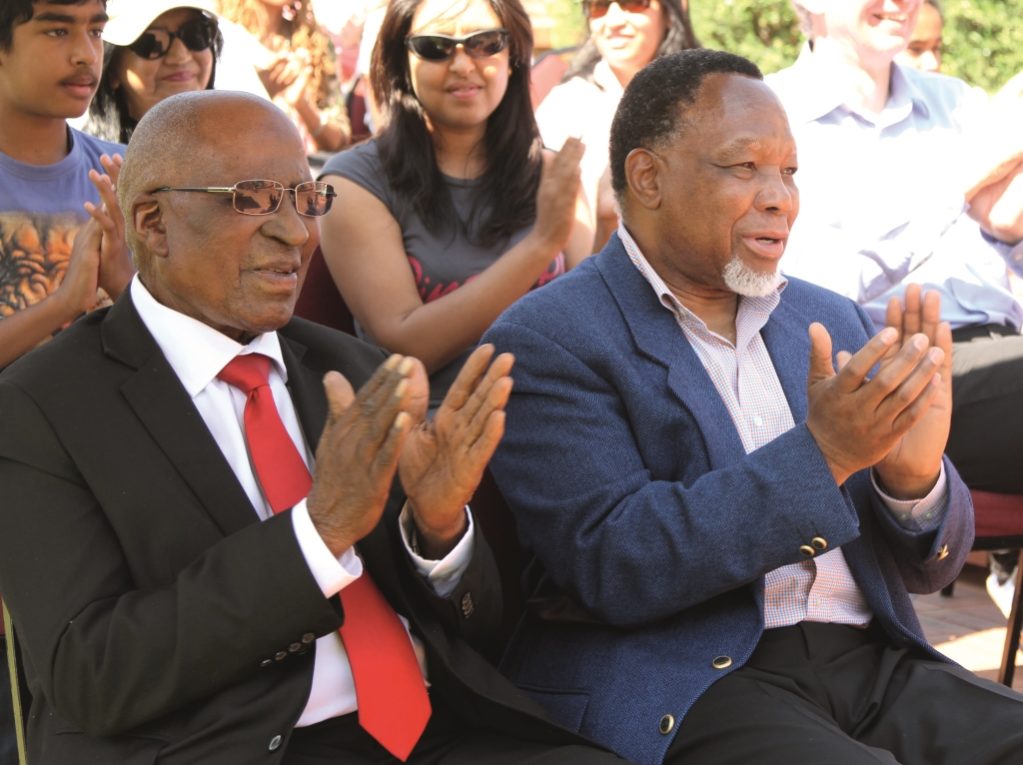When the music pumped, Andrew Mlangeni jived onto the dance floor – carrying with him the spirit of the men with whom he faced death half a century ago. Fiery and defiant, dancing with the female vocalist of the band. Everyone stood and cheered.
“Mlangeni, wherever your fellow Rivonia peers are, they are proud of you,” says Sipho ‘Hotstix’ Mabuse, one of the men who played music.
For a moment, you could almost imagine a fortune teller putting his hand on Mlangeni’s shoulder, as he faced the death penalty for sabotage on that cold winter’s morning in April 1964, in Pretoria.
“Don’t worry young man, you will live, see your country free, and 50 years later you will dance in celebration with a woman a third of your age.”

You couldn’t make up a story like that; a story of Mlangeni, Nelson Mandela and the Rivonia Trial. Indeed, Mlangeni was unlucky to be arrested at all, on that gloomy winter night in July 1963, and even luckier to survive. Mlangeni was asleep at his home in Dube, Soweto, where he lives to this day, when police came to arrest him. They had already picked up his late friend Elias Motsoaledi, who was in the back of the police car. Because the detectives had been brought in from outside Johannesburg, to clamp down on dissent, they didn’t know Soweto and drove past Mlangeni’s home several times.
“Motsoaledi told me that he was saying to himself ‘can’t this man wake up and run?’” says Mlangeni nearly half a century later.
Police eventually found Mlangeni’s back door, for which they had a key, and woke him in bed to tell him he was under 90-day arrest. It was 26 years before he set foot in his home again.
In Johannesburg Fort, that night, special branch officers put a cloth bag over Mlangeni’s head and poured water through it. The water seeped into his lungs and soon he was drowning. Close to the moment of death a special branch officer punched Mlangeni in the stomach. The force of it blew the water from his lungs and saved Mlangeni’s life.
This was the spirit Mlangeni brought to celebrate the 50th anniversary of the Rivonia Trial at Liliesleaf Farm on April 20. Mlangeni is one of the three survivors of the Rivonia trial – so called because that is where the arrests were made. Ahmed Kathrada and Denis Goldberg are other survivors of the 10 accused. Kathrada and Goldberg were traveling overseas, so Mlangeni held the fort on the dance floor.
The festivities were to commemorate the famous three-hour speech Mandela read from the dock before sentencing. On behalf of his co-accused, Mandela declared he was prepared to die for freedom.
“Comrade Mandela’s job was to make a political statement, about our struggle, about the suffering of our people, about the regime killing our people, banning our people, sending our leaders to exile. He spoke on our behalf when he said those words ‘If it need be, I am prepared to die’. It was a speech that affected the feelings of everybody in the country and abroad,” says Mlangeni.
“When the Rivonia trialists were arrested, I must have been 12 years old. My father walked into the house angry, I knew something was wrong. And this something that remained in our minds for many years… We celebrated it and, at some stage, I felt that that particular speech should resonate with what we do. We should be guided as musicians by those activities,” says Mabuse.
Mlangeni had the crowd in stitches as he recalled how he and his late friend Motsoaledi, father of the health minister Aaron Motsoaledi, could have been easily hanged. The two were responsible for a number of Umkhonto we Sizwe operations, the armed wing of the African National Congress. They took advice not to give evidence.
“All of the other accused took to the witness box, but in the case of comrade Motsoaledi and I, we were not to go to the witness stand. It was felt that if we went to the witness stand, the prosecutor would slaughter us, he would really cut us to pieces.”
Mlangeni is living proof that you cannot suppress a good man forever.
